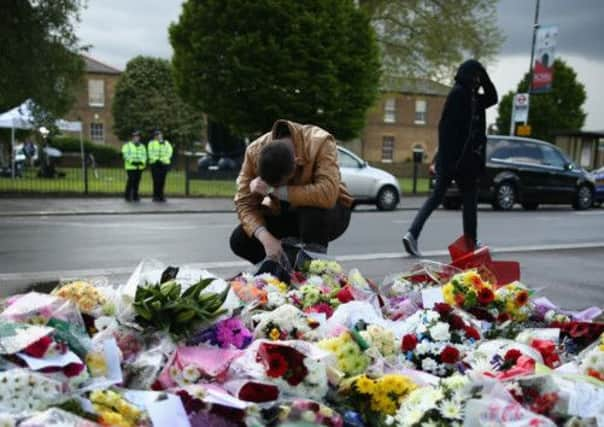Leaders: What price for vigilance? | Weather woes


A British soldier is incomprehensibly butchered in broad daylight in a suburban street near Woolwich Barracks in south London and one of the perpetrators, blood dripping from his hands, stays to harangue and abuse passers-by. Two men are being held under arrest in hospital after the murder of Drummer Lee Rigby of the 2nd Battalion the Royal Regiment of Fusiliers.
Reaction has been fast – and furious. Prime Minister David Cameron has roundly condemned the attack as an affront to the British way of life and insisted that violent terrorism will be vigorously confronted. He also praised the quick and forceful denunciation of Muslim community organisations and bodies. He has chaired meetings of Cobra, the government’s emergency response committee, to discuss security measures.
Advertisement
Hide AdAdvertisement
Hide AdWhat has appalled many about this galling attack was its brazen nature. This was no surreptitious or clandestine assault, but one that appeared intended to shock by its random and public nature. Against this, there is little by way of precautionary or risk-mitigating behaviour that the public can take. Previous terrorist incidents have resulted in extra security at airports and the entrances to public buildings and constant vigilance in public places against unattended parcels and shopping bags.
Defence against further attacks such as that on Thursday truly tests the ability of the police and security forces to provide protection that does not involve more vigorous surveillance and intrusion and further encroachment on civil liberties.
Calls are already being made to allow the security forces greater access to electronic and communications data and though they should not be dismissed, their usefulness in catching attackers such as those who struck in Woolwich is not obvious.
To the pursuit of justice and calling to account of the murder of Lee Rigby, another urgent raison d’etre has been added. There is a real and present danger of such acts inflaming extremism in the other direction. The flames of ethnic hatred were soon being fanned by supporters of the English Defence League. For these elements, the murder of a British soldier in uniform in a London street is particularly inflammatory.
How much more commendable, especially given the acute danger involved, was the reaction of Ingrid Loyau-Kennett who, in an astonishingly brave intervention, engaged one of the killers in conversation “before he starts attacking somebody else”. As is so often the case, the best defence against such acts of barbarism is the cool-headed bravery of ordinary members of the public.
In the meantime the police and the security forces need to step up their vigilance of extremist groups, the preachers of hatred and those who follow them.
Emigrating Brits blame the weather
Please do not adjust your set. Here is the weather forecast. It will become cloudy and wet with strong to gale force winds. Rain will spread into northeastern areas with strong winds and gales near eastern coasts. This will move southwards to other areas by dawn. It will feel cold for this time of year.
Familiar? It’s not a TV repeat. With a few glorious exceptions, our weather has continued to be cold. And it has been cold for most of the past three months – the coldest spring since 1979.
Advertisement
Hide AdAdvertisement
Hide AdOutdoor building work has been hit, garden centres deserted, summer clothes sales have shrivelled, retailers across the board have suffered – and the energy utilities have enjoyed boom demand – and at record high prices.
Coming after last year’s wettest summer since Noah built the ark, little wonder this has left us feeling miserable and depressed – and that a report by a visa and immigration services company reveals visa applications to emigrate from the UK are up by 15 per cent from the same period last year.
A key reason? Bad weather. The company says it has received 257,389 requests for support with “immigration solutions” for people wanting to emigrate over the past four months, a rise of 34,347 from the same time last year. The moribund economy will have contributed. But the final killer, it seems, has been the weather.
For this we cannot blame austerity, the EU, or the interminable “Indyref” debate. But the weather may well have contributed to our sense of entrapment, grievance and misery.
When warmer times come, as they surely will, we will rush outdoors, go fishing, tidy the garden, play golf – and enjoy the escape from the torrid weather within.